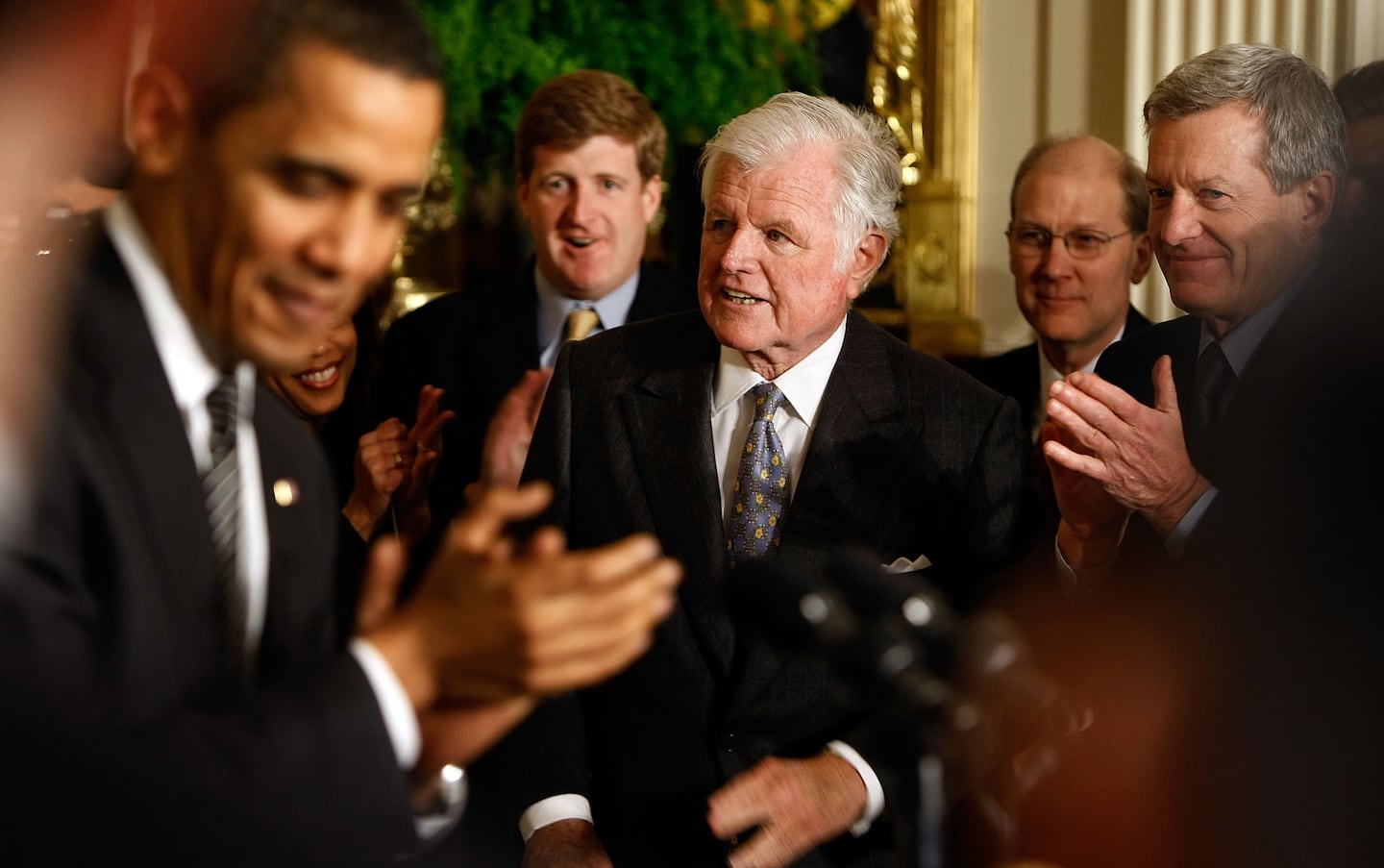Write to us at startingpoint@globe.com. To subscribe, sign up here.
In a word, here’s why the federal government remains shut down after nearly a month: Obamacare. More than 15 years after it became law, fighting over the Affordable Care Act continues to define our politics.
The shutdown is only the latest example. Since Obamacare passed, it has survived Republican repeal efforts, challenges at the Supreme Court, and criticisms that it didn’t do enough to lower health care costs. That last issue is behind the shutdown, which began after Senate Democrats demanded that Congress extend subsidies that make health insurance purchased through Obamacare’s marketplaces cheaper.
And much of that drama is thanks to Massachusetts.
Obamacare is named for a Democratic president, but it might not exist without a Republican. In 2006, then-Massachusetts Governor Mitt Romney signed a bill establishing a state health insurance marketplace that let uninsured residents buy coverage. So-called Romneycare, which President Obama saw as an effective way to expand coverage, became Obamacare’s blueprint.
But Romneycare’s design also prefigured a criticism that still dogs its successor: that despite expanding coverage, Obamacare didn’t change the fact that Americans pay more for health care than anyone else. So under President Biden, Democrats passed subsidies that knocked an average of $705 off the annual cost of insurance purchased through Obamacare’s marketplaces. But Democrats could only muster enough support to fund the subsidies until the end of this year.
That deadline helped set up the impasse that caused this month’s shutdown. In exchange for funding the government, Democrats want a deal to extend the subsidies. Republicans, who have long opposed Obamacare, have so far refused.
GOP opposition to Obamacare, which culminated in a failed effort to repeal it during President Trump’s first term, may also trace to the Bay State. During the 2008 presidential election, Senator Ted Kennedy promised Obama his endorsement — if Obama made health care reform, a dream of Kennedy’s, his top priority. Obama agreed, and Kennedy and his aides later helped craft the bill.
But Kennedy’s health was failing. He spent much of 2009 away from the Senate getting treatment for brain cancer. Lawmakers of both parties later suggested that Obamacare might’ve won some Republican support had Kennedy, known for his bipartisan friendships, been well enough to lead the negotiations. Instead, the law passed the Senate without a single GOP vote.
But even if you don’t buy that Republicans would’ve supported a Democratic president’s top legislative priority, Massachusetts shaped the version of Obamacare we got in another way.
Kennedy’s death in August 2009 triggered a special election — won by Scott Brown, a Republican who explicitly campaigned against Obamacare. That cost Democrats their filibuster-proof Senate majority, forcing the House to swallow the less progressive version that had already cleared the Senate.
“Losing Kennedy’s seat forced Democrats to settle for a bill that had even more compromises than they had hoped,” Jonathan Cohn, a journalist who wrote a book about Obamacare, has told me. Those compromises helped contribute to progressive dissatisfaction with the law. (A different New England senator, Joe Lieberman of Connecticut, also refused to back a so-called public option, a government-run insurance plan that could’ve become a forerunner to the Medicare for All system that many progressives favor.)
Brown’s win also empowered legal challenges to Obamacare. The hastily written law lacks a clause that protects it from being overturned entirely if parts of it are ruled unconstitutional. That omission is one reason why repeated Supreme Court challenges have kept the partisan fight over the law alive.
Besides the subsidies, which will spike Obamacare’s insurance premiums for 337,000 people in Massachusetts and millions of other Americans if not extended, politics are also driving the ongoing shutdown. Despite its early struggles, the law has become popular and Democrats see defending it as a winning issue. Meanwhile, Trump and many Republicans claim to have a plan to replace it with something better, despite having never produced one.
So no matter how the shutdown resolves, there may be even more fights over Obamacare. Thanks, Massachusetts.
Read more:
The Department of Agriculture said it won’t distribute federal food aid this week, citing the shutdown in an online statement that blamed Democrats. In Massachusetts, needy families, grocers, and farms are already feeling squeezed.The shutdown closed public bathrooms in Salem at the peak of Halloween tourism. Nonprofits and residents raised the money to reopen them.Accepting an award last night from a nonprofit named for Kennedy, former president Biden urged Americans to “fight like Teddy would fight” to defend democracy.
🧩 2 Down: Comfort | 🌤️ 54° Cool and breezy
 Makai King, 10, is a fan of the MBTA.Andrew Burke-Stevenson/for The Boston Globe
Makai King, 10, is a fan of the MBTA.Andrew Burke-Stevenson/for The Boston Globe
Love train: Makai King, a Roxbury fourth grader with autism, has earned a small but fiercely supportive TikTok following with videos about his passion for the T.
Staying power: Carlo DeMaria, Everett’s six-term mayor, has overcome cooperating with the feds and accusations of sexual harassment. Can he withstand allegations that he wrongly paid himself $180,000 in bonuses to win a seventh term?
Boston Public Schools: As the Trump administration cracks down on DEI, BPS leaders are set to vote next week to eliminate admissions policies meant to make exam schools more diverse.
State of emergency: Eight in 10 legislative aides, policy directors, and other staff who keep the Massachusetts State House functioning are unhappy with their salaries and half plan to leave their jobs soon, a survey found.
Dr. Michael Zinner: The innovative former pancreatic cancer surgeon at Brigham and Women’s brought hope and “no regrets” to his own struggle with the disease, which he diagnosed himself. He died at 80.
Transgender rights: A Newton City Council candidate wrote last year that letting trans kids use the bathrooms and locker rooms that correspond with their gender identity posed risks to other children. He says he’s not “anti-trans.”
East Wing: The 123-year-old White House structure, which has greeted visitors, held movie screenings, and hosted the first lady’s offices, is gone. See photos from its history. (WashPost 🎁)
Trade talks: US and Chinese negotiators signaled optimism ahead of Trump’s planned meeting with Xi Jinping, China’s leader, this week. Treasury Secretary Scott Bessent said he didn’t think the US would have to impose the 100 percent tariffs Trump threatened if China restricted rare-earth mineral exports. (WSJ 🎁)
Trade war: After Trump pledged an additional 10 percent tariff on Canadian goods over a factual ad featuring Ronald Reagan criticizing tariffs, Ontario Premier Doug Ford said he’d stop airing the ad in the US today. But other Canadian lawmakers are backing Ford. (CBC)
Louvre heist: French authorities arrested two men suspected of helping steal eight jewels from the famed museum. One suspect was apprehended at Charles de Gaulle airport and the other outside Paris. (Le Monde)
By David Beard
🏠 Home of the Week: Check out this 1960 Campanelli ranch in Hingham for just under $1 million.
⚖️ Would this help? A new wave of fitness enthusiasts are using glucose monitors in hopes it will help them lose weight. Should you?
📺 This week’s TV picks: “Shiva Baby” Rachel Sennott’s debuts her new project, Emma Thompson enters “Slow Horses” territory, and Colin Farrell and Tilda Swinton tangle in the Philippines.
💃🏽 Blind Date: “The moment she mentioned going dancing I knew I liked her.”
🏃🏿♀️➡️ Running businesses: The top 100 women-run businesses and nonprofits in Massachusetts include a few surprises.
🏃➡️ Running for sanity: “I run because of my father. Running connects me to my father, reminds me of my father, and gives me a way to avoid becoming my father.” (Atlantic 🎁)
📖 Books, books, books! After the Boston Book Festival, readers keep giving us ideas for books on chilly nights. Yolette Ibokette says she is nourished by Liz Walker’s memoir “No One Left Alone.” Denise Micale likes “The Heaven and Earth Grocery Store” by James McBride. Jennifer Dever Wood recommends Charlotte McConaghy’s “Once There Were Wolves.” During these stressful days, Jennifer writes, reading or listening to books can “replace doomscrolling.” 👏
Thanks for reading Starting Point.
This newsletter was edited by David Beard.
❓ Have a question for the team? Email us at startingpoint@globe.com.
✍🏼 If someone sent you this newsletter, you can sign up for your own copy.
📬 Delivered Monday through Friday.
Ian Prasad Philbrick can be reached at ian.philbrick@globe.com.

